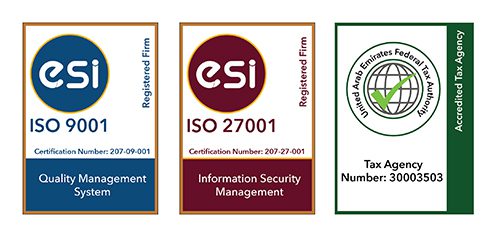UAE Federal Corporate Tax – Public Consultation
May 11, 2022 / Haroon Juma / VAT & Tax Blogs

On 31 January 2022, the UAE Ministry of Finance (MoF) announced the introduction of The UAE Federal Corporate tax (CT). Under this announcement, corporate tax will be effective for financial years starting on or after 1 June 2023.
The UAE Corporate Tax will be applied across all of the Emirates and to all business and commercial activities except for the extraction of natural resources. This will continue to be subject to Emirate-level taxation.
Based on the press release and FAQs, the UAE Corporate Tax system will follow most other countries. It is likely the UAE Corporate Tax system will be a residence-based model that taxes the worldwide profits of UAE resident businesses, and only the UAE-sourced business income of non-residents.
Our insights into the initial announcement provide a summary of the main aspects announced under the FAQs can be found HERE.
Public Consultation Issued
Subsequent to this, On 28th April 2022 The UAE Ministry of Finance (“MoF“) announced a public consultation procedure open to 19 May 2022 on the proposed UAE Federal Corporate Tax (“CT“) framework encouraging businesses to make their submissions online.
Of relevance to MNCs subject to the Pillar 2 framework, is that no details or insight on the UAE Corporate Tax regime with the Pillar 2 Model Rules is provided.
This public consultation does not represent the final view of the UAE Government. As a result, the statements in this communication are indicative and should not be fully relied upon to make any definitive decisions. The submission link can be found HERE.
In-Scope Entities
As detailed in the FAQs, all UAE-established businesses are within the scope of the UAE Corporate Tax Law.
The consultation document highlights potential exemptions for the following businesses:
- Governments;
- Wholly-owned government entities listed in a Cabinet Decision;
- Natural-resource extraction and exploration that are subject to Emirate-level decrees;
- Charities and other public benefit organisations;
- Public and regulated private social security and retirement pension funds; and
- Investment funds.
The consultation document provides initial details on the applicability of each exemption.
In addition, limited partnerships, general partnerships, and other unincorporated vehicles are to be treated as transparent for UAE Corporate Tax purposes. Limited liability partnerships and other types of partnerships (where there is a limited liability) are to be subject to the UAE CT framework.
Tax Grouping
References are also made to the potential conditions to form a fiscal unity group (UAE Corporate Tax Group) under which one could support the transfer of tax losses between affiliates and the exemption of certain income streams.
A Corporate Tax Group can be formed between group entities with at least 95% ownership in the entities. This will allow for a single consolidated tax return to be filed by the group. Entities within the CT Tax Group are jointly and severally liable for the tax position.
Businesses that operate in a UAE Free Zone that sell to the UAE mainland are unlikely to qualify for the 0% Corporate Tax rate. Therefore, businesses will need to consider the segregation of free zone and mainland activities to achieve the 0% CT rate.
Record Keeping
The consultation document sets the requirement for businesses to have proper financial (accounts) and other record-keeping procedures maintained regardless if the entity is exempt from UAE Corporate Tax. Therefore businesses should review and take additional steps to prepare for the correct record-keeping requirements regardless of their exemptions under UAE Corporate Tax.
Free Zone Treatment
Free zone entities are expected to be subject to 0% CT provided that they demonstrate adequate substance and comply with the regulatory requirements. This applies to income generated from outside the UAE and from other entities in any other free zone. The details that underpin the question of adequacy are not elaborated upon.
In the event, that a free zone entity holds a mainland branch, the income of a mainland branch will be subject to UAE Corporate Tax, without the free zone entity losing the 0% CT rate for its free zone income.
Passive income (such as dividends, interest, royalties, and capital gains) derived from mainland entities by a free zone entity will be subject to 0% Corporate Tax applicable to the free zone.
Other payments made by a mainland entity to a free zone entity are expected to be treated as non-deductible in the mainland entity. Income from those payments would disqualify the free zone entity from eligibility for the 0% CT rate.
Other Important Aspects
A number of key aspects that require consideration by businesses are set out in the consultation document. The key ones are:
- A fixed place of business and dependent agent permanent establishment definitions (corresponding to OECD guidelines) are to be included in the UAE Corporate Tax framework.
- Exemption of dividend income and/or capital gains if more than 5% shareholding is held, and the foreign subsidiary is stated as subject to at least 9% corporate tax (or equivalent).
- Foreign branch exemption may possibly be available.
- Interest expense is expected to be limited to 30% of EBITDA.
- Inclusion of transfer pricing regulations is included which emphasise the application of the arm’s length principles (in line with OECD guidelines), and transfer pricing documentation requirements (including disclosure of transactions with related parties and connected persons) should be in place.
Treatment of Tax Losses
Some detail is presented with respect to the treatment of tax losses. The consultation documents state Tax losses could offset 75% of taxable income within a tax year. In addition, excess tax losses could be carried forward indefinitely. This may be disallowed subject to a change in ownership provision.
Historical tax losses incurred before the introduction of UAE CT or registration for UAE CT are not expected to be available for use.
Tax losses could be shared between entities with at least 75% common ownership. However, tax losses of free zone entities that enjoy the 0% CT rate cannot be shared.
Administration of Corporate Tax
Procedures and management of the Corporate Tax regime will be managed by the FTA. The procedures will be on a self-assessment basis with the expected deadline for the filing of the returns and payment to be 9 months after the end of the financial year.
Immediate Actions
Whilst the public consultation document does not represent the final UAE Corporate Tax framework and is subject to modifications following stakeholder feedback, there are some important directional insights to take note of.
Several aspects of the legislation are likely to leverage OECD guidelines and principles with additional considerations relevant to the UAE economy specifically around free zones, recording keeping, and administration.
Businesses should take note and participate in the consultation to shape the final legislation, whilst taking some foundational steps, especially around the record-keeping and tax optimisation opportunities. Planning ahead and assessing the impacts are a prerequisite to minimising the tax burden on businesses and minimising the risks.
How We Can Help?
As an FTA Tax Agency operating to ISO 9001 & 27001 Certification, we help 100’s of client to cost effectively manage their financial and Tax reporting model. Preparing for the new law will be essential to optimise your tax obligations.
We can transform your company’s finance function to help improving cash flow, profitability, and overall growth.
Contact us today to know more!
About SimplySolved
At SimplySolved, we save your time, resources, and costs. Whether you need help with Outsourced Accounting, Finance, Corporate Tax, Employee Management & Payroll and ERP & E-Commerce Integration. we have the expertise and solutions to help.
Subscribe to mailing list
Partner With SimplySolved
Serving over 300+ clients we know the challenges your business faces operating cost effective, compliant and efficient back office operations.
As an FTA Accredited Tax Agency with ISO 9001 Quality & 27001 Information Management Certification, we offer a quality-based approach to our services supported by dedicated team of certified professionals.
We support our clients with defined processes, platforms and expertise to deliver advisory, project and outsourced services in Accounting, Tax, Auditing, HRM & Payroll & ERP solutions. Our offerings are specially designed to meet the UAE Regulations to put you in control of your information, comply to the legislation and help you make better business decisions.
Copyright © 2024 | SimplySolved | All Rights Reserved.




